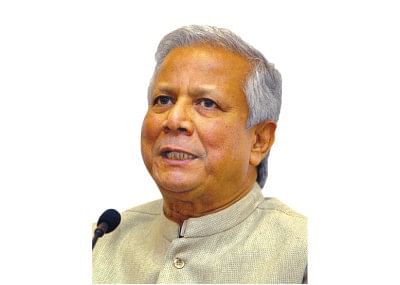Yunus ready to sit with PM

Grameen Bank founder Prof Muhammad Yunus has said it would be an honour for him to sit with Prime Minister Sheikh Hasina to find a solution to issues, if any, involving him or the Grameen Bank.
The Nobel laureate said this in an interview with New York-based daily The Wall Street Journal yesterday.
The following is the text of the microcredit pioneer's interview taken by Tom Wright of the newspaper by email.
WSJ: What are the risks to Grameen of the current stalemate? What could happen to the bank?
Mr. Yunus: My only concern is for the future of Grameen Bank's 8.3 million borrowers, almost all of whom are low-income rural women. It is for their sake that I have repeatedly urged caution so that the transition to a new managing director can be a smooth process that doesn't create any disturbance or loss of confidence.
The real issue at stake is the right of the bank's 8.3 million borrowers to control their own financial future or whether they will be forced to cede their control to outside authorities. Grameen Bank has succeeded due to the fact that it is the borrowers themselves who have been in control of the bank. It is a unique institution.
If the borrowers lose control over their own bank, who will look after their interests?
WSJ: How much is politics playing a role in this saga? It seems odd that Sheikh Hasina would see you as a political opponent given that you are not formally in politics.
Mr. Yunus: I have stated many times that I have no political ambitions now and I am sure that the prime minister does not see me as a political threat to her. I am not a political threat to anyone, let alone Sheikh Hasina, twice elected prime minister by the people of Bangladesh, and whose party won a great majority in the last election.
But if the PM has any issues with me, either with respect to the operations of Grameen or otherwise, I would be honored to sit with her to find a solution.
WSJ: Is it rather that politicians see Grameen's borrowers as a potential vote bank?
Mr. Yunus: Grameen Bank borrowers are voters like any other citizen in the country.
I don't think anyone can influence them to do anything against their own wishes as they are capable enough to take their own decisions.
WSJ: Has the development of Grameen into a major business encompassing cell phones and yogurt helped to create a perception that the bank is a power center in itself and how has that affected relations with the government?
Mr. Yunus: Grameen Bank is a strong financial institution. It is an institution of 8.3 million empowered women and men who together own a thriving bank with $1.4 billon in deposits.
But whatever they are today is because of their hard work and diligence. It is their success. The borrowers of Grameen Bank have proved to the world that they are bankable and creditworthy and capable of controlling a major institution, and they have been the inspiration to millions of people all over the world, so why not a power center.
But whatever I or Grameen Bank has achieved, is the result of the efforts of the borrowers.
Grameen Bank has always been on good terms with the government and has viewed the government as the bank's partner from the start. The government holds a 25% share of the bank, and has always been a strong supporter of the bank in its fight against poverty.
Even the chairman of Grameen Bank is a government appointee, as are two other directors of the board. The relationship has always been a very friendly and cooperative one from both sides.
I don't know why the present crisis could not have been resolved amicably.
WSJ: What is your response to claims that there has been no succession planning at the bank and a number of high-level executives have left?
Mr. Yunus: Grameen Bank's legal framework lays down the method of selecting the managing director of the bank. There is no uncertainty about it.
As for some high-level executives leaving, yes, some went on early retirement and some left for other reasons. But this is nothing out of the ordinary. In fact, Grameen has many dedicated high-level executives who have been with the bank for many years and are perfectly capable of taking over the bank's leadership.

 For all latest news, follow The Daily Star's Google News channel.
For all latest news, follow The Daily Star's Google News channel. 




Comments